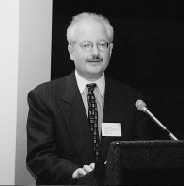Spring 1998
Inventing the Future of Journalism:
A Wish List
 Rem Rieder, editor and senior vice president of the American Journalism Review, was the keynote speaker at a workshop in Atlanta in January co- sponsored by the Pew Center and RTNDF. His subject: “Inventing the Future of Journalism.” While demurring on the task of predicting the future, Rieder did put forth this wish list. Rem Rieder, editor and senior vice president of the American Journalism Review, was the keynote speaker at a workshop in Atlanta in January co- sponsored by the Pew Center and RTNDF. His subject: “Inventing the Future of Journalism.” While demurring on the task of predicting the future, Rieder did put forth this wish list. |
Remember Relevance.
When I started out in the business a hundred years ago, nobody did much thinking about the ‘so what’ factor. You went to a meeting, you wrote a story about the meeting, they’d put it in the paper.
Today, news organizations don’t have that luxury. So it’s incumbent in reporting on government and politics at any level to concentrate on what matters to people and to spell out clearly why they matter and what their impact might be.
It’s also critical to broaden the definition of what’s news. New includes a lot more than cops, courts and City Hall. It’s easy to make fun of the new beats that have arisen with their oh-so-trendy titles. But I applaud the attempt to cover more things that matter to people from religion to ethics to children and family issues to aging.
Take It To The Street.
News is not just what happens in government buildings and what’s announced by official sources. Lots of news happens in the real world. Now I realize this is not a dazzling new insight. But too much reporting focuses on officialdom and doesn’t adequately explore how policy plays out on the street.
It’s critical that reporters get out of the office and deal with real people — a lot.
Too many papers don’t do a very good job of conveying a sense of place, of illuminating the distinct personality of the area they cover. More street level reporting can cure that.
Be More Open And Accountable.
News organizations have to be more willing to listen to citizens. That, of course, is one of the hallmarks of civic journalism. But that’s just the beginning. News organizations also have to be more aggressive in explaining to readers and viewers why they did what they did. When you talk to non-journalists about how newspapers work, they often are amazed at how much angst and deliberation goes into individual ethical decisions about how to handle news. Many say they have more respect for a decision when they know that it was carefully made, even if they disagree with the ultimate verdict.
Similarly, news organizations should do a better job of admitting when they are wrong. One of the remarkable recent events in journalism was San Jose Mercury News Editor Jerry Ceppos’s column admitting the paper had made serious mistakes in its series on the CIA and crack cocaine. Ceppos got a lot of positive attention for his mea culpa, which surprised him. The reason it had so much impact is that it was so unusual. It shouldn’t be.
If It’s Broken, Help Fix It.
Our news organizations are pretty good at reporting on problems. But if readers are constantly bombarded with reports of problems and aren’t presented with some potential solutions, a sense of hopelessness can kick in.
The big series on the big problem should always pay attention to possible fixes. Pieces on how other communities have tried to deal with similar problems should become staples.
None of this means that the newspaper should participate in a campaign, that it should lead the charge, that it should be a political player. But it should report seriously on serious problems, help identify possible answers and stay on course so that the community can make needed repairs.
Invest In The Newsroom. If news organizations are going to fulfill their missions, they need to provide the necessary resources. Doing the kind of reporting we’ve been talking about requires a lot more personnel than it takes to cover some meetings and make a few phone calls. But the money spent to make it possible is money well worth spending.
Liven Up. This is not a call for hype. We need to be more careful in our reporting, not less. But there also need to be things in the newspaper that are there simply because they are interesting or compelling or fun.
Drop The Facade. The power of a newspaper in a monopoly market — as most are — is enormous. That doesn’t mean we pull our punches. But in making decisions we always need to consider consequences and they should always be part of the decision equation.
Strive For Credibility And Reap The Rewards. It’s a crowded media landscape out there, a world filled with 24-hour news channels and talk radio and fax products and an astonishing array of Web sites… But there’s a big difference between the solitary musings of a guy with a Web site and work produced by trained journalists imbued with the values of the profession.
And in a media world that can be awfully confusing, over time it stands to reason that news consumers will gravitate to a place that helps them sort through the chaos and has a track record of competence and believability.
